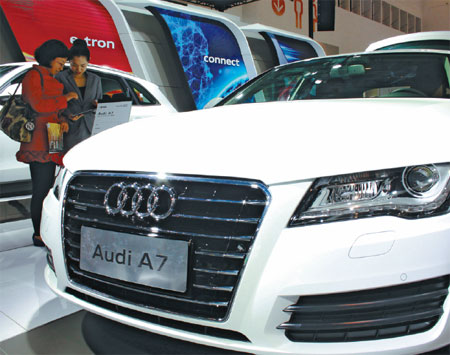Automakers lower prices following monopoly concerns
|
An Audi A7 is shown at an international auto exhibition in Hainai province. Major luxury car manufacturers are reducing the prices of their vehicles, parts and after-sales service under pressure from Chinese anti-trust regulator's monopoly concerns. Shiyan / China Daily |
Antitrust regulator's investigation prompts response from three giants
Major international luxury car manufacturers are reducing the prices of their vehicles, parts and after-sales service under pressure from Chinese antitrust regulator's monopoly concerns.
"Cutting prices is a business act, and the government welcomes it," said Xu Kunlin, director of the Bureau of Price Supervision and Anti-Monopoly under the National Development and Reform Commission on Monday, confirming the moves of those luxury automakers came after "they were contacted".
"Price cutting is one of their remedial measures," Xu said. "If they lower the prices to a reasonable level, that means they are sincere."
Xu told China Daily that his colleagues are collecting evidence to examine the pricing of vehicles and spare parts, but the investigation is not aimed at luxury automakers but "any companies that have such problems".
However, Xu did not provide any names of suspected monopolies, saying "it is not yet the time to give more details as the issue is not over."
British luxury vehicle manufacturer Jaguar Land Rover on Friday announced adjustments in its suggested retail price for three models available in China.
The company said in a statement that the move is in response to the investigation in the auto industry by the Bureau of Price Supervision and Anti-Monopoly of the NDRC.
It also said the adjustments are expected to strengthen competitiveness and increase market share in China's luxury auto market.
Effective on Aug 1, the suggested retail price of the Range Rover 5.0 V8, Ranger Rover Sports 5.0 V8 and Jaguar F-Type Cabriolet will be reduced by an average of 200,000 yuan ($32,323).
Regional President of Jaguar Land Rover Greater China, Bob Grace said: "As the result of our guiding principle of 'Customer First', we will do everything possible to work together with our Chinese retail dealer partners to offer customers the highest levels of support in all respects, whether that is vehicle sales or after-sales service."
German brand Audi, the sales leader in China's luxury vehicle segment, also announced on Saturday that it will cut the prices of China-made models' spare parts by up to 38 percent starting on Aug 1, in response to the anti-monopoly investigation into the auto industry.
"As a leading premium auto brand in the Chinese market, we are proactively supporting the investigation of the anti-monopoly bureau under NDRC and cutting the prices of our products to benefit our customers," said Ge Shuwen, executive deputy manager of FAW - Volkswagen's Audi division, in a statement on Audi's website.
Citing the example of the locally made Audi A6L, Ge said the prices of its spare parts combined will fall to less than three times from more than four times the model's price.
However, the statement did not mention whether there will be price cuts on original spare parts of imported Audi models.
German automaker Mercedes-Benz was the first to officially reduce the cost of after-sales for its major models by launching its Start Maintenance Menu earlier on July 1.
Covering both smart cars and Mercedes-Benz models, including the A-, B-, C-, E-, GLK-, M-, R-, and S-Class, the cost of maintenance will be cut by 20 percent on average and the reduction for some specific models could be as much as 50 percent.
When the company was contacted by China Daily on Monday, it had no comment to make on the relationship between the price cut and NDRC's monopoly investigation. It said, "Mercedes has an ongoing relationship, a constructive one, with NDRC."
Marc-Oliver Nandy, executive vice-president of After-Sales at Beijing Mercedes-Benz Sales Service Co Ltd, said earlier that with the Menu, maintenance of a Mercedes-Benz becomes transparent regarding contents and price. "We offer our customers an enhanced experience at a competitive, fair price point."
Karsten Engel, president and chief executive officer of BMW China, said on Monday that the company has not been involved in any antitrust investigation by NDRC.
"BMW's parts and after-sales pricing is transparent in China," he said.
According to Engel, BMW is "the first and the only one" in the automobile industry since 2006 that not only permits but also encourages its authorized dealer organization to sell genuine BMW parts to independent repair workshops, which "we call the fourth-level business".
To better benefit its customers in after-sales, Engel said, "BMW also permits our dealerships to direct purchase vehicle parts from OES (original equipment supplier), not as our competitors' way of requiring the dealers to source the parts only from OEMs (original equipment manufacturer)."
However, he said BMW does not encourage the parts supply directly from OES.
An insider of Japanese automaker Nissan's luxury brand Infiniti also said on Monday that the company "has not been contacted by NDRC", and the company's pricing has already been competitive in the market.
China's Anti-monopoly Law, which took effect in 2008, allows industry regulators to impose fines between 1 and 10 percent of the affected company's revenues in the previous year.
"The monopoly status is quite common in automobile industry, so that the investigation is necessary to curb it," said auto analyst Zhang Zhiyong.
"The monopoly behaviors vary from limiting dealers' price bottom, regulating dealers' sales in different regions to the restriction of parts-sourcing only from OEMs and so on," said Luo Lei, deputy secretary-general of the China Automobile Dealers Association.
"The more than 20 percent annual growth in China's luxury vehicle segment in recent years helped support such activities by automakers," he added. "And the investigation is expected to regulate and deter the sector."
Contact the writers at lifangfang@chinadaily.com.cn and lifusheng@chinadaily.com.cn

























